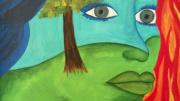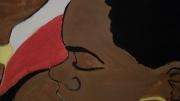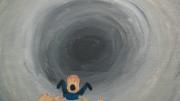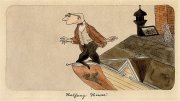Ruthann Traylor learned of research on stereotypes by Amy Cuddy, a social psychologist at Harvard Business School, years ago when they were neighbors. (Cuddy was then studying for her doctorate at Princeton.) “I read the section on how the poor and homeless were perceived to 12 poor and homeless women at the shelter,” says Traylor, who is now the director of ArtSpace, a homeless shelter in West Trenton, New Jersey, run by HomeFront, a nonprofit social service agency. “We spent a year and a half responding to this perception by collecting poems and art work by the people I work with.” In April 2010, an exhibition of this work opened at Princeton’s Woodrow Wilson School for Public and International Affairs, with a panel discussion two weeks afterward featuring Cuddy and fellow psychologists Susan Fiske and Peter Glick; 200 attended, and the exhibition ran into August.
In the gallery here, see some examples of paintings by these homeless artists, made in response to the research that showed the homeless were generally perceived as both cold and incompetent.










